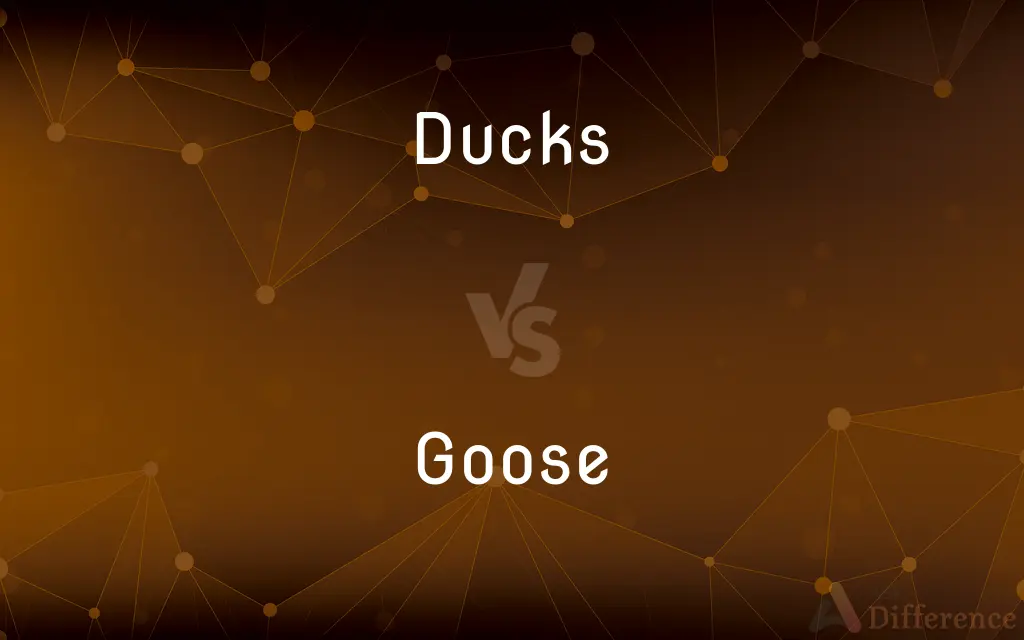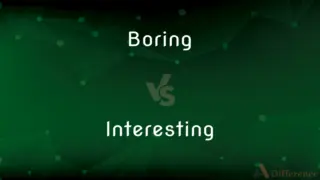Ducks vs. Goose — What's the Difference?
Edited by Tayyaba Rehman — By Fiza Rafique — Updated on September 26, 2023
Ducks are smaller, web-footed waterfowl with broad flat bills, while a goose is a larger waterbird with a longer neck and typically migratory behavior.

Difference Between Ducks and Goose
Table of Contents
ADVERTISEMENT
Key Differences
Ducks are a diverse group of waterfowl known for their broad flat bills and strong swimming abilities. Goose, on the other hand, stands out with its longer neck, often allowing it to graze more like a terrestrial bird.
While Ducks are usually smaller and more versatile in both aquatic and land habitats, a goose tends to be larger with strong migratory patterns, often traveling in V-shaped formations. Ducks can be found in both fresh and saltwater environments, dabbling at the water's surface for food. In contrast, a goose usually prefers freshwater habitats and grazes on land for a significant portion of its diet.
The vocalizations of Ducks are often quacking sounds, diverse in tone and pitch. Goose, however, produces honking noises, which can be loud and resonant. These vocal differences can often be a tell-tale sign when distinguishing between the two in the wild.
In terms of social behavior, Ducks can be both solitary or move in groups. But the goose is notably social, especially during migration, when they form iconic V-shaped formations in the sky. This formation assists them in conserving energy during their long flights.
Comparison Chart
Size & Appearance
Smaller waterfowl with broad flat bills.
Larger bird with a longer neck.
ADVERTISEMENT
Habitat & Behavior
Found in both fresh and saltwater, dabbling for food.
Prefers freshwater, grazes on land.
Vocalization
Produces quacking sounds.
Produces honking noises.
Social Behavior
Can be solitary or move in groups.
Notably social, especially during migration.
Grammatical Form
"Ducks" is plural, denoting more than one duck.
"Goose" is singular; the plural is "geese".
Compare with Definitions
Ducks
Often domesticated for meat, eggs, or ornamental purposes.
The farmer had a dozen ducks in his backyard.
Goose
Large waterbird with a longer neck.
A lone goose grazed near the lakeside.
Ducks
Birds adapted for swimming and floating.
Ducks gracefully glided over the calm water.
Goose
Known for migratory behavior in V-shaped formations.
The sight of a goose formation in the sky signals the change of seasons.
Ducks
Omnivorous birds consuming aquatic plants and small creatures.
Ducks dived underwater searching for food.
Goose
Herbivorous bird grazing on land.
The goose nibbled on the fresh green grass.
Ducks
Web-footed waterfowl with broad bills.
The pond was full of ducks enjoying the afternoon sun.
Goose
A goose (plural geese) is a bird of any of several waterfowl species in the family Anatidae. This group comprises the genera Anser (the grey geese and white geese) and Branta (the black geese).
Ducks
Birds with varied colorations and species.
Different species of ducks displayed vibrant plumage.
Goose
A large waterbird with a long neck, short legs, webbed feet, and a short broad bill. Generally geese are larger than ducks and have longer necks and shorter bills.
Ducks
Any of various wild or domesticated waterbirds of the family Anatidae, characteristically having a broad flat bill, short legs, and webbed feet.
Goose
A foolish person
‘Silly goose,’ he murmured fondly
Ducks
A female duck.
Goose
A tailor's smoothing iron.
Ducks
The flesh of a duck used as food.
Goose
Poke (someone) in the bottom.
Ducks
(Slang) A person, especially one thought of as peculiar.
Goose
Give (something) a boost; invigorate
The government's desire to goose the tired housing market
Ducks
Often ducks (used with a sing. verb) Chiefly British A dear.
Goose
Any of various wild or domesticated waterbirds of the family Anatidae, and especially of the genera Anser, Branta, and Chen, characteristically having a shorter neck than that of a swan and a shorter, more pointed bill than that of a duck.
Ducks
A quick lowering of the head or body.
Goose
The female of such a bird.
Ducks
A plunge under water.
Goose
The flesh of such a bird used as food.
Ducks
A durable, closely woven heavy cotton or linen fabric.
Goose
(Informal) A silly person.
Ducks
Ducks Clothing made of duck, especially white pants.
Goose
Pl. goos·es A tailor's pressing iron with a long curved handle.
Ducks
An amphibious military truck used during World War II.
Goose
(Slang) A poke, prod, or pinch between or on the buttocks.
Ducks
A similar vehicle used for civilian purposes, as to evacuate flood victims or for sightseeing tours. In both senses also called DUKW.
Goose
To poke, prod, or pinch (a person) between or on the buttocks.
Ducks
To lower quickly, especially so as to avoid something
Ducked his head as the ball came toward him.
Goose
To move to action; spur
Goosed the governor to sign the tax bill.
Ducks
To evade; dodge
Duck responsibility.
Ducked the reporter's question.
Goose
To give a spurt of fuel to (a car, for example); cause to accelerate quickly
"The pilot goosed his craft, powering away" (Nicholas Proffitt).
Ducks
To push (a person, for example) suddenly under water.
Goose
Any of various grazing waterfowl of the family Anatidae, which have feathers and webbed feet and are capable of flying, swimming, and walking on land, and which are bigger than ducks.
There is a flock of geese on the pond.
Ducks
In bridge, to deliberately play a card that is lower than (an opponent's card).
Goose
A female goose (sense 1).
Ducks
To lower the head or body.
Goose
The flesh of the goose used as food.
Ducks
To move swiftly, especially so as to escape being seen
Ducked behind a bush.
Goose
A silly person.
Ducks
To submerge the head or body briefly in water.
Goose
(archaic) A tailor's iron, heated in live coals or embers, used to press fabrics.
Ducks
To evade a responsibility or obligation. Often used with out
Duck out on one's family.
Goose
A young woman or girlfriend.
Ducks
In bridge, to lose a trick by deliberately playing lower than one's opponent.
Goose
An old English board game in which players moved counters along a board, earning a double move when they reached the picture of a goose.
Ducks
(poker slang) A pair of twos.
Goose
To sharply poke or pinch the buttocks of (a person).
Ducks
Dear (used as a pet name).
Hello ducks, how are you today?
Goose
(transitive) To stimulate; to spur.
Ducks
(nautical) The light trousers worn by sailors in hot climates.
Goose
To gently accelerate (an automobile or machine), or give repeated small taps on the accelerator.
Goose
(UK slang) Of private-hire taxi drivers, to pick up a passenger who has not booked a cab. This is unauthorised under UK licensing conditions.
Goose
To hiss (a performer) off the stage.
Goose
Any large web-footen bird of the subfamily Anserinæ, and belonging to Anser, Branta, Chen, and several allied genera. See Anseres.
Goose
Any large bird of other related families, resembling the common goose.
Goose
A tailor's smoothing iron, so called from its handle, which resembles the neck of a goose.
Goose
A silly creature; a simpleton.
Goose
A game played with counters on a board divided into compartments, in some of which a goose was depicted.
The pictures placed for ornament and use,The twelve good rules, the royal game of goose.
Goose
Web-footed long-necked typically gregarious migratory aquatic birds usually larger and less aquatic than ducks
Goose
A man who is a stupid incompetent fool
Goose
Flesh of a goose (domestic or wild)
Goose
Often domesticated for meat and down feathers.
The farmer raised a goose for the holiday feast.
Goose
Produces loud honking sounds.
The honking of a goose echoed across the meadow.
Common Curiosities
Is a goose typically larger than a duck?
Yes, a goose is generally larger with a longer neck.
What do ducks typically sound like?
Ducks are known for their quacking sounds.
What is the plural form of goose?
The plural form of goose is "geese."
Can ducks live in saltwater environments?
Yes, ducks can be found in both fresh and saltwater habitats.
Are both ducks and goose considered waterfowl?
Yes, both ducks and goose are waterfowl.
Do ducks graze on land like a goose?
Ducks typically dabble in water for food, while geese are more prone to graze on land.
Are the terms "ducks" and "geese" interchangeable?
No, while both are waterfowl, they represent different types of birds with distinct characteristics.
What do geese primarily eat?
Geese primarily graze on land, consuming grass and other vegetation.
Do all geese migrate?
While many geese species migrate, not all do. It depends on the species and their specific habitat needs.
Are both ducks and goose often domesticated?
Yes, both are domesticated, often for meat, eggs, or ornamental purposes.
What is the significance of a goose's V-shaped flight formation?
This formation helps geese conserve energy during migration.
Are all ducks similar in appearance?
No, there are various species of ducks with diverse colorations and appearances.
Can you find ducks in the ocean?
Yes, some species of ducks, like sea ducks, are adapted to marine environments.
Can both ducks and goose fly?
Yes, both ducks and goose are capable fliers, though their flight patterns and styles may differ.
Are ducks and goose closely related?
Yes, both belong to the Anatidae family, making them closely related.
Share Your Discovery

Previous Comparison
Boring vs. Interesting
Next Comparison
Cake vs. GateauAuthor Spotlight
Written by
Fiza RafiqueFiza Rafique is a skilled content writer at AskDifference.com, where she meticulously refines and enhances written pieces. Drawing from her vast editorial expertise, Fiza ensures clarity, accuracy, and precision in every article. Passionate about language, she continually seeks to elevate the quality of content for readers worldwide.
Edited by
Tayyaba RehmanTayyaba Rehman is a distinguished writer, currently serving as a primary contributor to askdifference.com. As a researcher in semantics and etymology, Tayyaba's passion for the complexity of languages and their distinctions has found a perfect home on the platform. Tayyaba delves into the intricacies of language, distinguishing between commonly confused words and phrases, thereby providing clarity for readers worldwide.
















































